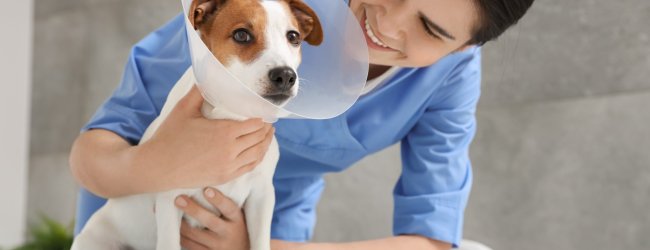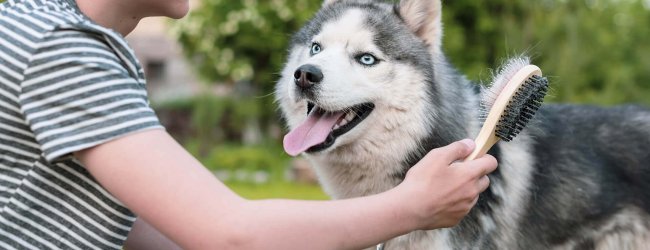 Approved by Dr. Dwight Alleyne, DVM
Approved by Dr. Dwight Alleyne, DVM Why Do Dogs Eat Poop? 5 Reasons Why & How To Stop It
Instincts, boredom, anxiety, curiosity - you wouldn't be the first to wonder, why do dogs eat poop? Here's how to put an end to this messy behavior without compromising on your buddy's tendency to explore the world, nose-first.
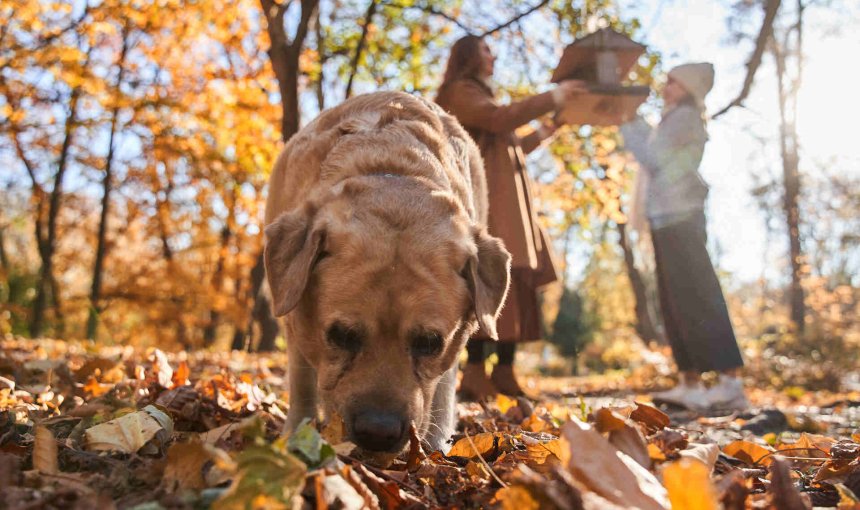
Our dogs can be weird little goofballs at times – that’s a given. But let’s admit it, they do get up to some bizarre things from time to time. So if you’ve landed here wondering, why does my dog eat poop? you’re definitely not alone! We’ll cover all the reasons behind this behavior, what health concerns it can cause and how you can prevent your dog from venturing into any…messy situations, nose-first.

Always know your buddy is healthy & safe
Read moreWhy does my dog eat poop?
Dogs tend to eat poop out of instinct. In the wild, wolves and wild dogs might eat their own poop to protect their pack from parasites. It also helps keep their dens clean to keep other predators away. Mama dogs might do the same for a new litter of puppies to keep everything clean. So while the thought of your dog eating poop can make you throw up a bit in your mouth, it’s actually pretty normal for dogs – especially puppies. With some of the reasons including:
| 1) Nutritional deficiencies | Sometimes dogs eat poop because their bodies instinctively know they need more essential nutrients. So it could be because your dog’s diet needs more vitamins, minerals, or enzymes. |
| 2) Curiosity & boredom | Dogs – and especially puppies – tend to explore the world, nose-first. So it’s possible poop doesn’t smell…well, “bad” to them the way it does to us. It’s just like a fascinating (if yucky) new toy for them. |
| 3) Attention-seeking | Dogs that feel they aren’t getting enough attention might just eat their poop to get you to fuss over them a bit. Any attention is better than no attention, after all! |
| 4) Anxiety or stress | Some dogs might have learned to…well, eat their own poop as a coping mechanism. This could be due to a big change in their environment or if they’re stressed out somehow. Which could be due to separation anxiety, for example. |
| 5) Past experiences | If your dog was punished harshly for having an “accident” while potty training, they might eat their poop to hide the evidence and avoid being scolded. |
Why do dogs eat their own poop AND pee?
Turns out, the reasons are often similar to why your dog eats poop alone. They could be trying to clean up after themselves, especially if a previous owner scolded them for accidents around the house. Or it could be a way to cope with stress or anxiety, like if there’s a “predator” or something scary in their environment. (Which could also be a new pet or baby, or loud noises outside, including thunder or fireworks.) So it’s possible your dog is trying to eliminate any “evidence” – either of them making a mistake they were punished for in the past, or to “hide” from something scary in their environment.
Why do dogs eat cat poop?
At least one reason your dog might end up rummaging through your cat’s litter box is because…well, it smells good. Which makes sense when you think about it. Dogs are omnivores while cats are obligate carnivores. So cats’ diets tend to include more protein sources. Which can send your dog’s nose into overdrive as they pick up on the protein-packed scent of your cat’s…well, you know.
Why do puppies eat their poop?
If you’re house-breaking a puppy, don’t worry – any poop eating is usually just a phase. Puppies are little balls of instinct and endless energy, so they haven’t learned yet that they shouldn’t be sticking their noses and mouths into just about everything. So if your puppy comes across their own poop – or another animal’s – it’s possible they just see it as another new “toy” to sniff around and play with.
Most dogs do outgrow this habit with proper training, so be patient and consistent with your little buddy. You do want to avoid getting mad at them if they have an accident around the house, since it can just develop a maladaptive behavior instead.
Health risks that come with your dog eating poop
If your dog’s in the habit of snarfing up any spoor they see in their path, it could always open up their risk of picking up:
- A parasitic infection, especially worms from eating other animals’ poop.
- Bacterial infections, like salmonella or E. coli.
- Gastrointestinal trouble, including vomiting and diarrhea.
So if you’re noticing your dog making a beeline for any droppings while you’re out together, it’s time to address the underlying issue behind why your dog’s doing it.
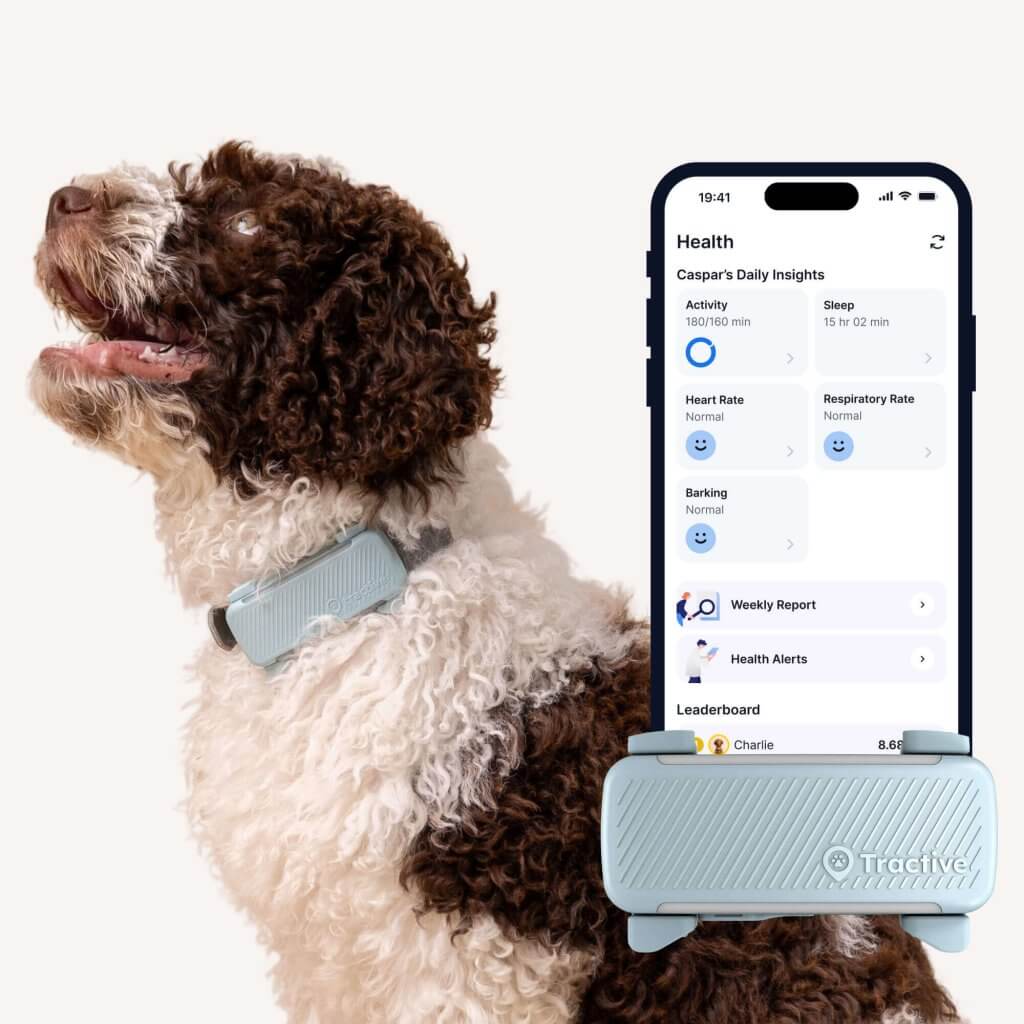
Get health alerts for your dog
Our pups can’t always tell us if something’s wrong. But if their tracker detects unusual changes in their routine, you’ll get an alert, helping you catch potential issues early.
What steps can I take to address my dog’s behavior?
Your vet is your best source of advice and support on how you can address the underlying cause for your dog eating poop. So with their help, it’s a good idea to:
- Rule out medical issues with your vet, especially if your dog’s behavior comes out of nowhere or is just excessive. It could be an underlying health issue, like a nutritional deficiency or even an infection. Your vet can prescribe you enzyme or probiotic supplements or even taste deterrents – or even anti-anxiety medication.
- Be extra careful what your dog eats. Check with your vet what nutrient-dense dog food options would be a good fit for your buddy. Also be mindful that feeding your dog raw food or too many treats could open up their risk for infection or missing out on nutrients.
- Be patient with your dog around toilet time. Pick up after them right away if they do have an accident in the house and do your best not to scold them. A consistent toilet routine in the mornings and evenings can go a long way helping your buddy relax.
- Don’t skip out on your basic training. Teaching your dog commands like “Drop it,” or “Come back,” are more consistent than just yelling “No!.” They communicate your expectations more clearly and help your dog understand what you want them to do. (Or not do.)
- Prevent your dog from getting bored. Keeping your dog mentally active is as important as regular walks and exercise. Consider installing puzzle toys, or food dispensers around your house to keep them occupied. Regular playtime and some quality time together also work wonders. Else, try a few hours of dog TV on YouTube to keep them occupied while you’re away – and get someone to check up on them periodically for toilet breaks.
Where a GPS tracker can come in handy
If your dog tends to spend their time primarily indoors, you’re best off sealing off your kitty litter and being extra watchful around toilet breaks. These can help you intervene quicker before your buddy has a chance to get rid of the “evidence.”
But if your dog spends any amount of time outdoors – whether with you or left to their own devices – a GPS tracker can be tremendously helpful as an emergency measure. Like, for example, if you strap a Tractive device to your buddy’s collar, its Heat Map & Location History helps you pick up on where your dog tends to spend most of their time.
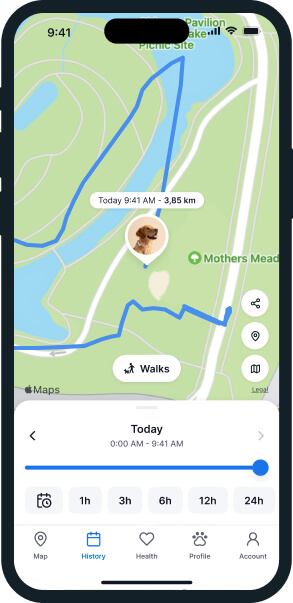
Which could just include areas where other animals tend to leave their…leftovers. Like, for example:
- Community dog parks,
- Wooded trails,
- Any fields or meadows near your property,
- Or even your neighbors’ backyards
So you can better understand your dog’s behavior, prevent them from venturing into these spots, and go extra prepared the next time you two head outdoors.
“We don’t have fencing around our property and our adventurous dog regularly gallivanted around our local town, inevitably ending up having eaten something horrendous. Finding her involved driving around looking for her and a great deal of luck.
Since putting the Tractive tag on her collar, we have had no trouble driving straight to her, wherever she might be, intercepting her before she can do herself any harm.”– Ryan, AU (Source: Trustpilot)
Your furry friend’s health and wellbeing means as much as to us as it does to you. So we’ve made it a priority to only share medically-relevant content on our blog. This post was checked, double-checked, and medically verified by Georgia-based vet, Dr. Dwight Alleyne.

Dr. Dwight Alleyne, DVM
Originally from Long Island, New York, Dr. Alleyne began his career at a no-kill animal shelter before becoming a licensed veterinary technician. He graduated from Cornell University Veterinary College in 2006 and completed an internship at Purdue University. Now practicing in Georgia, Dr. Alleyne specializes in soft tissue surgery and ultrasounds. He also writes pet health articles on his website, “The Animal Doctor Blog” (www.anmldrblog.com).
